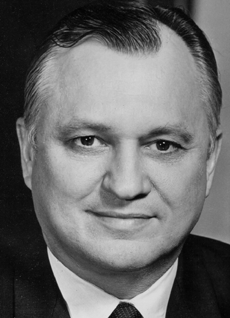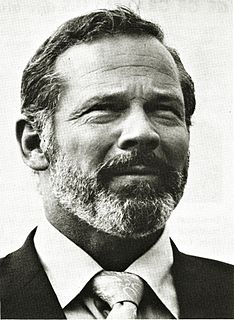
Frank Hughes Murkowski is an American retired politician and a member of the Republican Party. He was a United States senator from Alaska from 1981 until 2002 and the eighth governor of Alaska from 2002 until 2006.

The 2006 Alaska gubernatorial general election took place on November 7, 2006. The former mayor of Wasilla, Sarah Palin, was elected governor.

Leland Chancy Croft is a workers' compensation attorney and Democratic Party politician from the U.S. state of Alaska. Elected to the Alaska House of Representatives in 1968, he served a single term from 1969 to 1971. He was then elected to the Alaska Senate, serving in that body from 1971 to 1979, including serving as the president of the Senate from 1975 to 1977 during the 9th Alaska State Legislature.

On November 7, 2006, the state of Alaska held its general election. On the ballot were races for U.S Representative, Governor and Lieutenant Governor, 10 of 20 seats in the Alaska Senate, all 40 seats in the Alaska House of Representatives, 2 ballot measures, plus retention elections for 18 judges of the Alaska Superior Court and 13 judges of the Alaska District Court.

The 1998 Alaska gubernatorial general election took place on November 3, 1998. The election resulted in a landslide for the Democratic incumbent, Tony Knowles, who had won the 1994 gubernatorial election by only 536 votes. Knowles was the first incumbent governor to attain re-election since 1978. As of 2019, this is the most recent election in which a Democrat was elected Governor of Alaska and the most recent election in which an Alaskan governor was re-elected.

The number of elections in Alaska varies by year, but typically municipal elections occur every year, plus primary and general elections for federal and state offices occur during even-numbered years. Alaska has a gubernatorial election every four years. Members of the state's United States congressional delegation run for election or re-election at the times set out in the United States Constitution. Primary elections assist in choosing political parties' nominees for various positions. On a regional basis, elections also cover municipal issues. In addition, a special election can occur at any time.

The 1994 Alaska gubernatorial election took place on November 8, 1994, for the post of Governor of Alaska, United States. Democratic candidate Tony Knowles narrowly defeated Republican candidate Jim Campbell and Lieutenant Governor Jack Coghill of the Alaskan Independence Party. In the Republican Revolution year of the 1994 elections, Alaska's was the only governor's seat in the country to switch from Republican to Democratic.

The 2010 Alaska gubernatorial election took place on November 2, 2010. Former Governor Sarah Palin did not run, having resigned in July 2009. Incumbent Governor Sean Parnell, who as lieutenant governor succeeded Palin following her resignation, announced that he would seek a full term.

The 1990 Alaska gubernatorial election took place on November 6, 1990, for the open seat of Governor of Alaska. In 1989, incumbent Governor Steve Cowper, a Democrat, had announced that he would not seek re-election for a second term.

The 1986 Alaska gubernatorial election took place on November 4, 1986, for the post of Governor of Alaska. Incumbent Governor Bill Sheffield, a Democrat who was seeking re-election, was defeated by Steve Cowper in the Democratic primary election on August 26, 1986.

The 1982 Alaska gubernatorial election took place on November 2, 1982, for the post of Governor of Alaska. To replace outgoing Republican governor Jay Hammond, Democratic nominee Bill Sheffield defeated three opponents: Republican nominee Tom Fink, Libertarian nominee Dick Randolph and Alaskan Independence Party nominee Joe Vogler. Hammond had endorsed his lieutenant governor, Terry Miller, who lost the Republican nomination to Fink in the primary election.

The 2014 Alaska gubernatorial election took place on November 4, 2014, to elect the governor and lieutenant governor of Alaska, concurrently with the election of Alaska's Class II U.S. Senate seat, as well as other elections to the United States Senate in other states and elections to the United States House of Representatives and various state and local elections.

Mike J. Dunleavy is an American politician who is the 12th governor of Alaska, serving since December 2018. A Republican, Dunleavy was a member of the Alaska Senate from 2013 through 2018. Dunleavy defeated former Democratic United States Senator Mark Begich in the 2018 gubernatorial election.

The 1978 Alaska gubernatorial election took place on November 7, 1978, for the post of governor of Alaska. Republican incumbent Jay Hammond defeated four opponents: former Governor of Alaska and write-in candidate Walter Hickel, Alaska Senator and Democratic nominee Chancy Croft, former Commissioner of Natural Resources and Independent candidate Tom Kelly and Alaskan Independence Party nominee Don Wright. After losing to Hammond in the Republican primary, Hickel ran as a write-in candidate and was able to outperform Croft.

The 1974 Alaska gubernatorial election took place on November 5, 1974, for the post of Governor of Alaska. Republican challenger and mayor of Bristol Bay Borough Jay Hammond narrowly beat Democratic incumbent Bill Egan in a close race that was forced into a recount to verify the results. The formation of the new Alaskan Independence Party was considered to have a large impact on the race.

The 1970 Alaska gubernatorial election took place on November 3, 1970, for the post of Governor of Alaska. Former governor and Democratic candidate Bill Egan was able to defeat incumbent Republican governor Keith H. Miller after having lost his position in the previous election to Walter Hickel. Miller had been appointed to fill the rest of Hickel's term after Hickel was nominated to be the U.S. Secretary of the Interior under President Richard Nixon.

The 1966 Alaska gubernatorial election took place on November 8, 1966, for the post of Governor of Alaska. Republican challenger Walter Hickel narrowly defeated incumbent Democratic governor Bill Egan, falling just 3 votes short of an overall majority.

The 1958 Alaska gubernatorial election took place on November 25, 1958, for the post of Governor of Alaska. It was Alaska's first gubernatorial election as a U.S. state, although this did not take effect until January 3, 1959. Democratic State Senator Bill Egan defeated Republican State Senator John Butrovich, Jr..

The 2018 Alaska gubernatorial election took place on November 6, 2018, to elect the governor and lieutenant governor of Alaska. In the primaries for recognized political parties, candidates for governor and lieutenant governor run separately. The winners of each respective primary for governor and lieutenant governor then become a joint ticket in the general election for their political party.

















